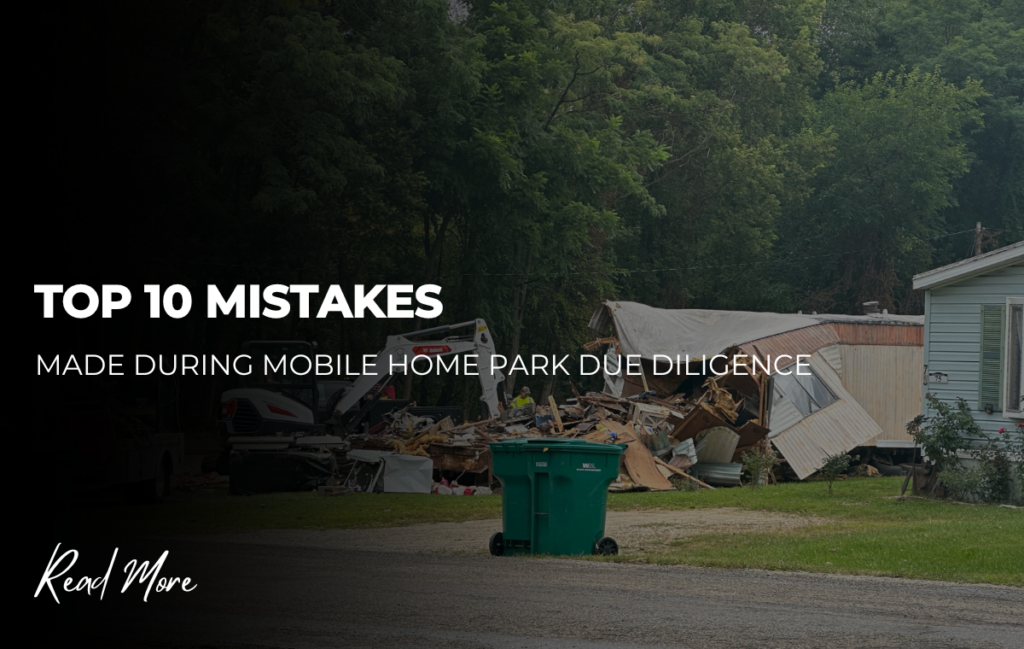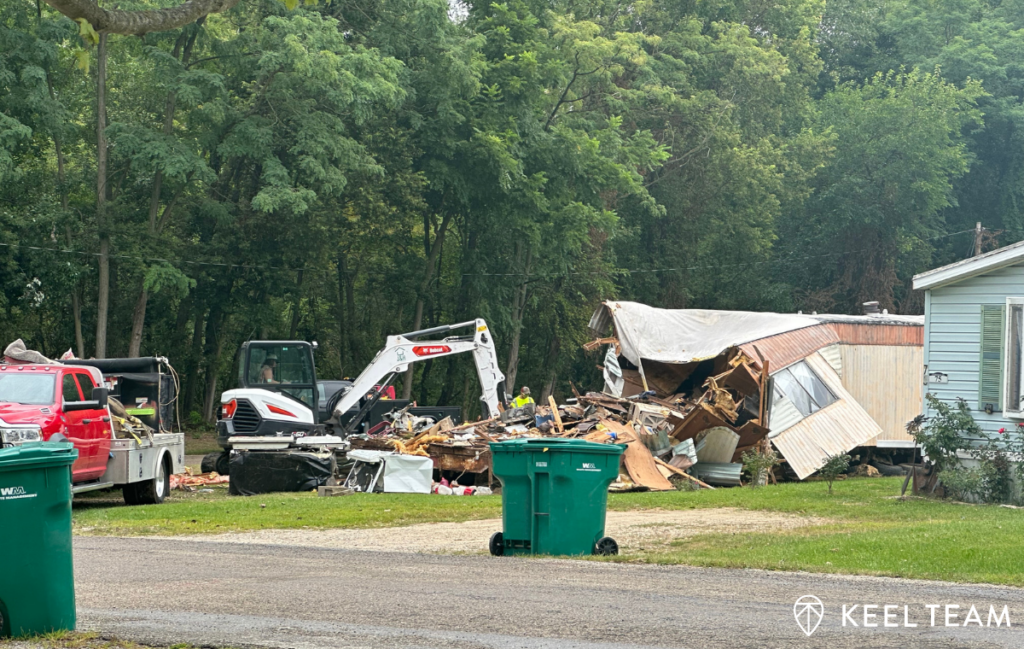Top 10 Mistakes Made During Mobile Home Park Due Diligence
-
 Tristan Hunter - Investor Relations
Tristan Hunter - Investor Relations

Conducting due diligence on a mobile home park can be complex. Mistakes during this process may lead to significant financial and operational challenges. To help avoid these pitfalls, it’s important to understand common issues that could arise and take steps to mitigate them. In this blog post, we explore the top 10 common mistakes made by investors during mobile home park due diligence.
1. Obtain a Zoning Certificate and Verify Setback Requirements
One of the first steps in due diligence for a mobile home park is obtaining a zoning certificate. This document confirms that the property conforms with local zoning regulations or if it is grandfathered under previous rules. Failing to obtain this certificate could lead to significant issues, especially if there are restrictions on the homes that can be brought into the trailer park. It’s also crucial to verify setback requirements, particularly if you plan to bring in new homes. Ensuring these homes meet fire safety regulations is essential to avoid potential hazards.
2. Account for Property Tax Increases
Property taxes are likely to increase after purchasing a mobile home park. Failing to account for this potential increase in your financial projections may lead to an unexpected drop in net operating income (NOI). When planning your budget, it’s wise to contact the local assessor’s office. They can estimate what the property taxes might be after reassessment. This approach can help prevent financial surprises that could negatively impact your investment.
3. Invest in an ALTA Survey
While boundary surveys are less expensive, they do not provide the comprehensive details needed for mobile home park transactions. An ALTA survey offers a more detailed look at the property, including utility locations and setback requirements. This information is critical, especially when dealing with older mobile home parks where homes may be placed over utility lines or encroach on neighboring properties. Investing in an ALTA survey upfront can save you from costly issues down the line.
4. Review a Full Year of Utility Bills
Reviewing only a few months of utility bills might not give you the full picture of a mobile home park’s utility usage and costs. A full year of bills can reveal patterns and potential issues like water leaks that may require significant repairs. Speaking with the plumber or utility company that serviced the trailer park can also help you understand any recurring issues. This proactive step can help you identify and address problems before they escalate into major expenses.
Are you looking for more information on mobile home park investing and due diligence? Download our FREE eBook and learn expert tips from Andrew Keel!

5. Always Order a Phase 1 Environmental Inspection
A Phase 1 Environmental Site Assessment (ESA) is crucial in identifying potential environmental hazards, such as underground storage tanks or contamination. Skipping this step could expose you to significant liability if environmental issues are discovered later. While a Phase 1 ESA may seem like an unnecessary expense, it provides peace of mind and can prevent future legal and financial problems.
6. Inspect Behind the Mobile Homes
During site visits, it’s important to inspect not just the front of the mobile homes but also the areas behind them. Issues like poor drainage, unhooked sewer lines, or illegal dumping often occur out of sight. Walking behind the homes allows you to identify problems that could lead to costly repairs or pose health hazards to residents. This thorough inspection can prevent you from inheriting problems that were not visible during a quick drive-through.
7. Enter All Park-Owned Homes
Assuming that park-owned homes are in good condition based on exterior appearances may be a costly mistake. It’s essential to enter each home to assess its true condition. You might find issues such as hoarding, severe damage, or safety hazards that are not apparent from the outside. These conditions could require extensive repairs or even demolition, which you need to factor into your budget.
8. Budget for Acquiring Titles for Park-Owned Homes
Acquiring titles for park-owned homes can be a time-consuming and expensive process, especially if titles are missing or incorrect. It’s important to budget for these costs and consider holding funds in escrow to cover the expenses of obtaining proper titles. Engaging a service that specializes in mobile home titles can streamline the process. Still, it’s essential to ensure that all titles are in order before finalizing the purchase.
9. Consult with the Power Company Engineer
Before bringing in new homes to a mobile home park, consult with the power company’s engineer to understand the power supply and distribution. Newer homes often require more power, and older trailer parks may not have the infrastructure to support them. Understanding whether additional transformers or power lines are needed can prevent issues like brownouts and ensure that the mobile home park can accommodate new homes without requiring costly upgrades.
10. Review Google Reviews and Local Reputation
Google reviews provide valuable insights into the condition and management of a mobile home park. Negative reviews might highlight issues such as poor management, flooding, or frequent utility outages. These reviews should be considered during your due diligence process, as they can indicate potential challenges you may face after acquisition. Additionally, speaking with locals, such as restaurant staff near the mobile home park, can provide further insights into the trailer park’s reputation and any issues that may not be immediately apparent.
Conclusion
Due diligence in mobile home park investing is a complex process requiring attention to detail and careful planning. By avoiding these common mistakes, you can better assess the risks and opportunities associated with a potential investment. While no process is foolproof, taking the time to thoroughly investigate all aspects of a mobile home park can help you make informed decisions and avoid costly surprises down the line.
Learn more about mobile home park investing.
Interested in learning more about mobile home park investing? Get in touch with us today to find out more.
Disclaimer:
The information provided is for informational purposes only and is not investment advice or a guarantee of any kind. We do not guarantee profitability. Make investment decisions based on your own research and consult registered financial and legal professionals. We are not registered financial or legal professionals and do not provide personalized investment recommendations.

Tristan Hunter - Investor Relations
View The Previous or Next Post
Subscribe Below 👇





